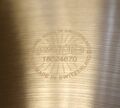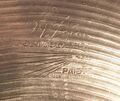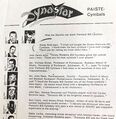Paiste Serial Numbers
Paiste serial numbers were first applied during 1972. Prior to this there was no accurate means of determining the age of a Paiste other than to identify the years of production for the series or model, when known.
These cymbals are referred to as "Pre-Serial" cymbals.
It should also be noted that it is not uncommon for serial numbers to be difficult to read due to hammering and lathing. In these cases, the era of the cymbal can usually be identified, but the exact year may not be determined.
Also of important note, cymbals have been found without serial numbers stamped on them from production eras where we might expect them.
This guide does not apply to serial numbers on many prototypes, nor the German made Paistes which seem to have been numbered from 1xxxxx up. see German serial number section below.
1972 - 1981
- Starting some time during 1972 there were six digit numbers stamped on each cymbal.
The specific year is identified by the 'first' digit in the serial number. Some believe a leading 1 means 1971, but we haven't found one having checked thousands.
All 6 digit serials with a leading 1 check out as 1981 for Swiss made cymbals. The German made ones do have leading 1, but that isn't the year* (see explanation below).
- Therefore, "345678" would be a cymbal manufactured in 1973.
- The original 1970's style involved no additional lettering with the serial number such as series name.
- Research is starting to show that Paiste Nottwil put serial numbers on the lower lines in 1972 and 1973 (at least some of the time) and then stopped this practice in very early 1974, choosing only to put serial numbers on the professional lines (F602, 2002 and later Sound Creation) for the rest of the Black Label era.
- All series (except Paiste 101) were using black labels during this era.
- Black Label Bottom.jpg
Black Label (bottom side)
As a general rule for all Paiste lines made in Switzerland:
- 6 digits no lettering: 70's first digit indicating year (6xxxxx) is 1976
- 6 digits with plain PAISTE stamp: 80's, (3xxxxx) is 1983
- 6 digits with pAisTe (logo): stamp 90's, (2xxxxx) is 1992
- 8 digits from second half 90's.
**German serial numbers**
Some collectors are sure they have 1971 production Paiste cymbals with serial numbers starting with 1xxxxx, they are in fact German made Paistes with a different serial numbering format.
German-made 2002's started receiving serial numbers from late 1974 to early 1975 onwards: they used a different system than the Swiss system (they are numbered consecutively), the first digit does not equal the year!
If you are looking at a German Black Label Paiste from the 1970s, the second digit is a good general indicator of the year here's a breakdown (these dates are not exact):
1971 ~1973 no serial numbers
1974-1979 serial numbers : 10xxxx-20xxxx (17xxxx serial is from around 1977 or 1978. a lower third digit: 171xxx most likely = 1977 while a higher third digit 179xxx puts you around 1978)
(another example: #196181 late 70's)
1980 serial numbers: 20xxxx - 21xxxx
1981-1986 serial numbers: 22xxxx-3xxxxx (example: #228044 early 80's) (All 2oo2s with serial# 22xxxx are red labeled)
1986-1990 serial numbers: 3xxxxx-4xxxxx (example: #333994 mid 80's, #418074 late 80’s).
Confirmed specific dates from the German factory:
serial# 2612xx produced in November 1983
serial# 2984xx produced in October 1984
serial# 3244xx produced in August 1985
(Right before Paiste went to the printed color logos it looks like production increased and they started going through serials at a faster rate.)
The German plant is known for making all of the "lower line cymbals" through Paiste's history, it is understood that formula 602's and Sound Creations were never made in Germany.
Quite a few 2002’s were made there, especially for the German market (we do not see many here in the U.S).
Here is an example of German 2002’s with consecutive serial numbers most likely made in 1977:
1981 - 1986
- Starting in 1981, "PAISTE" started to be stamped above the serial number, often along with SERIES. (NOTE: This change occurred not at the beginning of the year, but sometime during it - some examples of the previous style exist with 1981 serial numbers.)
- Like before, the first number indicates year - the following would be an example of 1982:
- Formula 602 was shortened to simply "602".
- Sound Creation was located under PAISTE, due to space limitations.
- The RUDE and Colorsound 5 names were NOT stamped after PAISTE.
- 1981 Sound Creation Serial.jpg
1981 Sound Creation
- 1981 2002 Serial.jpg
1981 2002
- 1983 505 Serial.jpg
1983 505
- During this time Paiste changed label colors on some of their series. Formula 602 - Blue, 2002 - Red, 505 - Green, among others.
1986 - 1990
- Sometime during 1986 (probably when they launched all the new lines - 3000, 2000, 1000, etc.), "PAISTE" was stamped above the serial number, without series name.
- Like before, the first number indicates year - the following would be an example of 1989:
- 505 (discontinued by this time) and the 1000 lines both used green logos.
- 2002 and 3000 lines used red logos. The red ink on the 3000 series is a little darker color.
- Formula 602 and 2000 lines both used blue logos.
- 505 16 Crash.jpg
505
- 1000 18 Crash.jpg
1000
- 3000 20 Ride.jpg
3000
- 2000 16 Crash.jpg
2000
1990 - 1995
- Sometime in 1990 the company name was changed to the 'high/low' style" "pAisTe".
- Therefore "pAisTe 345678" would be from 1993.
1995 - 2011
- Sometime in 1995 Paiste started using eight digit serial numbers. In these cases, the first two digits represent the year of production.
- Therefore "96789012" would be from 1996.
- 1995 Signature Serial.jpg
1995 Signature
- 1999 Signature Serial.jpg
1999 Signature
- Starting in about 2005, "MADE IN SWITZERLAND" was added to the bottom logo of the 2002 cymbals.
2011 - present
- In the second half of 2011, Paiste started using a laser etched serial number on the cymbal's bottom side. Numbers are not stamped on the top side from this point on. The first two numbers are still the year produced.
- 2012 Giant Beat Serial.jpg
2012 Giant Beat
- 2017 Giant Beat Serial.jpg
2017 Giant Beat
- 2018 Signature Reflector Serial.jpg
2018 Signature Reflector
European, English & Japanese distributors
Collectors may run across odd looking logos from vintage Paistes during their online searches, below is some background detail and history on what one might find:
Dallas Arbiter: England
"Arbiter Ltd." and "Dallas–Arbiter" were the UK importers and distributors for Paiste.
Ivor Arbiter was a British-American drum designer, manufacturer, instrument salesman, and entrepreneur. In his early career, he was the owner and operator of a specialty drum shop in the West End of London.
Later, Arbiter founded or co-founded several instrument companies, including Arbiter–Western, Dallas–Arbiter and CBS–Arbiter. "Arbiter Ltd." was sold to Dallas in 1969 the company was renamed "Dallas–Arbiter".
Ivor Arbiter
SISME: Italy
SISME were the Italian importers and distributors for Paiste.
SISME had Paiste add "high performance" to the stamp on all the imported models, they also added "SISME distribution in red ink on the bottom of the cymbals.
- SISME DIXIE.jpg
"high performance" stamp
Pearl: Japan
There was a time when Pearl distributed Paiste in Japan. From research that time period seems to run from 1969 to 1979.
Below is a page from a 1979 Pearl JDM catalog showing the selection of Sound Creation, Formula 602, 2002, and 404's.
Of note here is the selection of 404s: it contains actual 404s and restamped Dixies as indicated by some of the sizes (12") and the Medium Thin and Crash Ride options.
The Dixie cymbals have a different emboss that includes the Pearl logo (see below).
U.S. distributors before 1965
Prior to Ludwig's exclusive deal with Paiste in ~1965 it looks like Bonne Music Center in Syracuse, NY was one of "the" places to get a Formula 602 in the early 1960s.
The cymbals even got an alternate emboss logo with the Dynastar name. Why the Dynastar name? That remains unclear. Around this time, the store also started importing a lot of other instruments from overseas, so maybe they tied them all together under the Dynastar brand name.
Information from the Paiste.com site[1]
Return to the Paiste Series Portal
Return to the Paiste Cymbal Type Portal







































































